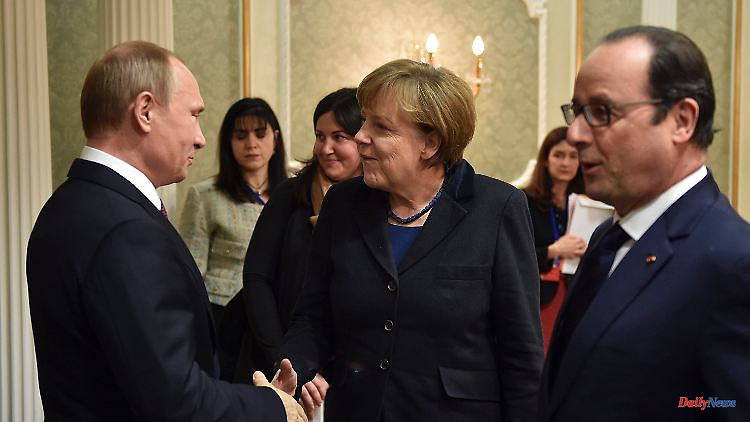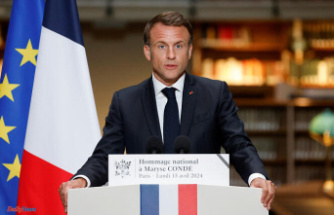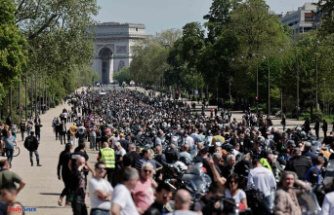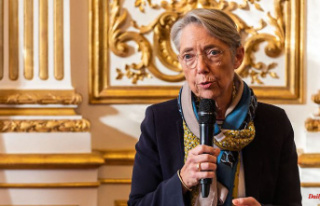Putin accuses former Chancellor Merkel of preparing Ukraine for an attack. The alleged basis for the allegation are statements by the former head of government about the Minsk agreements. But in fact everything was very different.
Since the interview with ex-Chancellor Angela Merkel in "Zeit", Russian state propaganda has been running at full speed again with its old motto: Germany and France would never have had an interest in the Minsk Agreement being implemented. Instead, they prepared Ukraine for war.
Merkel told the weekly in early December that the 2014 Minsk agreement was an attempt to give Ukraine time. "She also used this time to get stronger, as you can see today."
Russian propaganda thoroughly reinterprets this sentence. "The West talked about peace while preparing for an attack. And now they're admitting it without hesitation," Russian President Vladimir Putin claimed recently in his New Year's speech after the French ex-president, who was also involved in February 2015, said François Hollande supported Merkel's view.
Even if the former chancellor was clearly concerned with protecting her reputation, she is of course right that Ukraine used the time and actually became significantly stronger. The Russian account, however, has little to nothing to do with the truth. The original Minsk Protocol of early September was drawn up under enormous military pressure from Russia: After it had looked for a while in the summer that the Ukrainian army would be able to successfully expel the so-called pro-Russian separatists from the occupied parts of the Donetsk and Luhansk regions, the tide turned first direct deployment of regular Russian troops at the end of the summer.
A limited ceasefire was agreed on September 5, 2014, on the sidelines of the successful counter-offensive by Russian troops and the separatists, but it fell through at the end of September when the separatists attacked Donetsk airport. In January 2015, the separatists' offensive efforts intensified again, and the second direct deployment of Russian troops in February brought Ukraine the prospect of a major military defeat. Immediately after the Minsk II ceasefire, a set of measures to implement the September 2014 agreements, came into force, Russian troops, together with separatists, stormed and captured the city of Debaltseve - again in clear violation of a just-signed agreement.
Separatist attacks continued throughout 2015 until the front line was formed, which by and large held until the start of the great Russian invasion in February 2022.
The Minsk agreements were an achievement because they significantly reduced civilian deaths. According to the UN, 3,106 civilians died in Donbass between 2014 and 2021, most of them in the first two years. In 2020 only 26 civilians died, in 2021 only 25 - a significant part of these deaths had to do not with active combat operations, but with mine incidents. In this respect, the Russian propaganda line, which speaks of eight years of "genocide" against the population in the Donbass, is also irrelevant: In reality, the number of deaths has fallen continuously over the years and is not consistent with the situation as of February 24, 2022 to compare. The often used number of around 14,000 dead in the Donbass consists mostly of military personnel from both sides of the front line.
However, the Minsk agreements would never have been necessary if Russia had not sent its own troops to Ukrainian territory in violation of international law - until February 21, 2022, Russia also officially recognized the Donbass, unlike Crimea, which was annexed in 2014, as part of Ukraine. And while Minsk II was probably almost without alternative due to the difficult military situation for Ukraine, a critical question remains for Berlin and Paris as to how they came to support an agreement that partially violates international law and the territorial integrity of the Ukraine injured. The resolution initiated by Russia in the UN Security Council, which was based on the Minsk agreements, was one of the biggest blows to the system of international law that had been functioning since 1945. The unanimous approval took place on February 17, 2015, while Russian troops entered Debaltseve.
The Minsk agreements were designed as a kind of road map for the reintegration of the occupied territories into the Ukrainian state. In fact, the treaties, described by Putin's adviser at the time, Vladislav Surkov, as one of Russia's most important foreign policy victories, were a de facto declaration of Ukraine's surrender. The occupied parts of the Donetsk and Luhansk regions should have returned to Ukraine after the local elections. However, the election was supposed to take place before the handover of control of the Ukrainian-Russian border - that is, on a territory that the Ukrainian government did not control.
In addition, Donetsk and Luhansk should have been given major special rights: they would have retained their own "people's militia" and their own jurisdiction. Had the agreement been implemented, Russia would have had a Trojan horse within the Ukrainian state in the form of the "People's Republics" through which it could have influenced Kyiv. As a result, the Minsk agreements have never been particularly popular in Ukraine. Nevertheless, Merkel constantly put pressure on Ukraine to implement the points of Minsk II exactly as stated in the original document. Chancellor Olaf Scholz also stuck to Minsk during his last visit to the Kremlin on February 15, 2022.
It is clear that the literal implementation of Minsk in Ukraine would probably have led to similar protests as in 2004 and 2014. The debate about whether Kyiv wanted to implement the agreement or not is pointless, however, because Russia itself has repeatedly made implementation of the agreements impossible. It's not just about the fact that in February 2015 Russia broke the first point of the agreement, the ceasefire. The main focus is on developments since 2019 - since the election victory of current President Volodymyr Zelenskyy.
Zelenskyy ran in the election campaign as the peace president, who perhaps had no great illusions that "Minsk II" could be fully implemented, but who believed in the possibility of a stable ceasefire on the front line in Donbass. Just a few days after Zelenskyy's election victory and before he took office, Putin signed a decree according to which all citizens of the occupied territories who held a passport from the "People's Republics" were entitled to a Russian passport. The Minsk agreements were actually already dead in the spring of 2019, because this decree, which clearly aimed to integrate the Ukrainian territories into Russian national territory, clearly violated the spirit of the agreement.
Despite criticism from Ukrainian politics and society, Zelenskyj stuck to his peace policy. It was Zelenskyy's initiative to begin the mutual withdrawal of troops from three locations on the front line, which was agreed back in 2016, although there was no guarantee that the separatists would comply. Prisoner exchanges took place again after a long break. From the summer of 2020, a ceasefire lasted for half a year for the first time.
This ended in early 2021 with the first Russian troop deployment on the Ukrainian border. In parallel, the integration of the "People's Republics" into the political and economic life of Russia continued. It was above all Moscow and Putin who made any implementation of Minsk impossible, while Berlin and Paris were still trying in February 2022 to save the Minsk agreements as a diplomatic basis. Vain. On February 24, 2022, Zelenskyy became a war president - a role he never wanted to take on.












